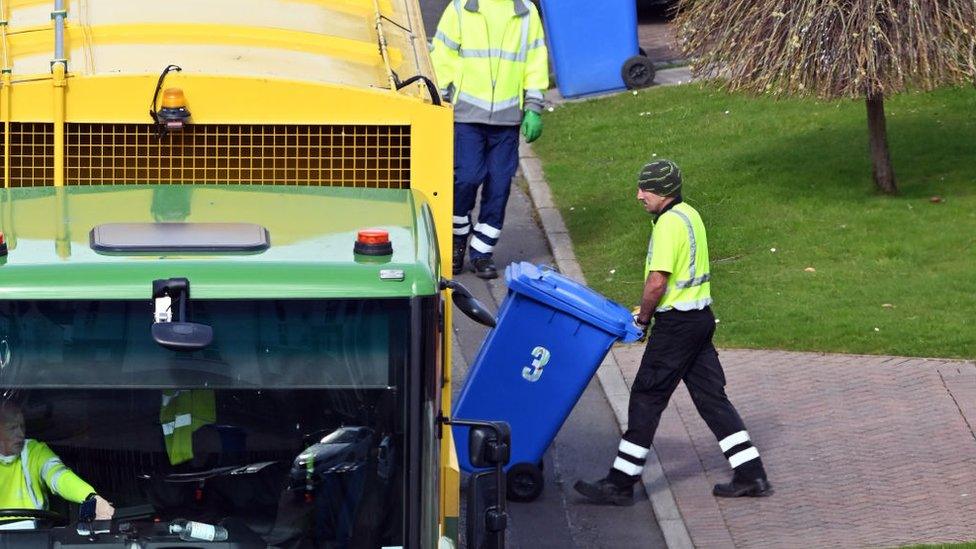Scotland's spending review: Union warns public sector job cuts unsustainable
- Published

Cutting 30,000 public sector jobs would be "unsustainable", a union leader has warned.
It comes after the Scottish government set out its plans at Holyrood on Tuesday to reform public services in the face of a £3.5bn funding gap.
Linda Sommerville, of the Scottish Trade Unions Congress, said the review had "set alarm bells ringing".
She added that the pay bill was to be held down over the next five years by job losses across the public sector.
"There are estimates of up to 30,000 job losses which is unsustainable," adding that services were already stretched.
Ms Sommerville added that there was nothing in the statement on the long-term investment needed to rebuild the economy.
She told BBC Radio's Good Morning Scotland programme that the economy had been harmed not just by Covid and Brexit but also by "years of austerity before that".
Unison, Scotland's largest union which represents public service workers, said there would be "catastrophic consequences", and that public services had already been "cut to the bone".
The union's Scottish secretary, Tracey Dalling, said: "The pandemic has shown us who really are the essential workers. It's the people who've looked after our elderly relatives, cared for our sick and dying in hospitals, the workers that deliver our housing, our education and social care, among others."
The cuts were not inevitable and were "a political choice by an out-of-touch Scottish government," she said.
Kate Forbes announced plans to cut public sector jobs
The Institute for Fiscal Studies has predicted that the Scottish government is facing a £3.5bn gap, external opening up between spending and income as a result of generous spending pledges and revenue from taxes being less than expected.
The Scottish government's finance secretary Kate Forbes announced plans to address the gap, which included public sector cuts.
She said the sector had grown for years but now needed to "reset" and become more efficient.
Public sector staffing has grown from about 410,000 to about 440,000 over the past five years, now employing about a fifth of Scotland's workforce.
The review said that while some growth related to the devolution of new functions to Scotland, such as elements of tax and social security, continued growth was not sustainable.
The spending review outlined plans to reduce the size of the public sector workforce to pre-Covid levels, with the aim of keeping the pay bill at 2022-23 levels - about £21bn a year.
It said that this should be achieved through "effective vacancy and recruitment management" and would allow remaining staff to be given year-on-year pay increases.
The government said it would consult with trade unions and workers to "navigate the challenge" of a post-pandemic reset.
'Staggering cuts'
The Scottish Police Federation, which is the union representing rank and file officers, warned that the "staggering cuts" would put "exceptional pressure" on the police service.
General secretary Calum Steele said staff in the police service would have to go if the government did not change its position.
He added: "People in the police service are essential for delivering that service. We are the only service that picks up the slack when others don't.
"Uniquely, we step in and we provide social work, mental health and local authority services when everybody else doesn't.
"So when we will see the inevitable pressures that local authority, health and social services will face as a consequence of the staggering cuts... there's only one service that these people will turn to, and that's the police."
The firefighters' union said the fire service had already suffered the loss of 1,000 members of staff, cuts to crewing levels and stagnation of pay.
The review showed the service's budget is to be frozen for the next five years - which it warned would put communities and firefighters in "greater danger".
In an exchange during First Minister's Questions on Wednesday, Tory leader Douglas Ross challenged Nicola Sturgeon on why £20m had been allocated to hold another independence referendum in the face of the public sector cuts.
He called the decision "shameful" and said the Scottish government was obsessed with independence.
Instead the cash should go towards education or the police service, he said.
But Ms Sturgeon defended the decision, saying it was "a really good investment" to give the people of Scotland "the opportunity to choose a better future".
Reacting to the spending review, the Fraser of Allander economic research institute at Strathclyde University said the 30,000 jobs to be cut would come from the devolved public sector - which covered local and the Scottish government as well as the likes of health.
The institute's director, Prof Mairi Spowage, told the BBC there was a danger of "salami slicing of lots of different services".
She said there needed to be a lot more discussion about the impact the cuts would have.
- Published31 May 2022
- Published31 May 2022